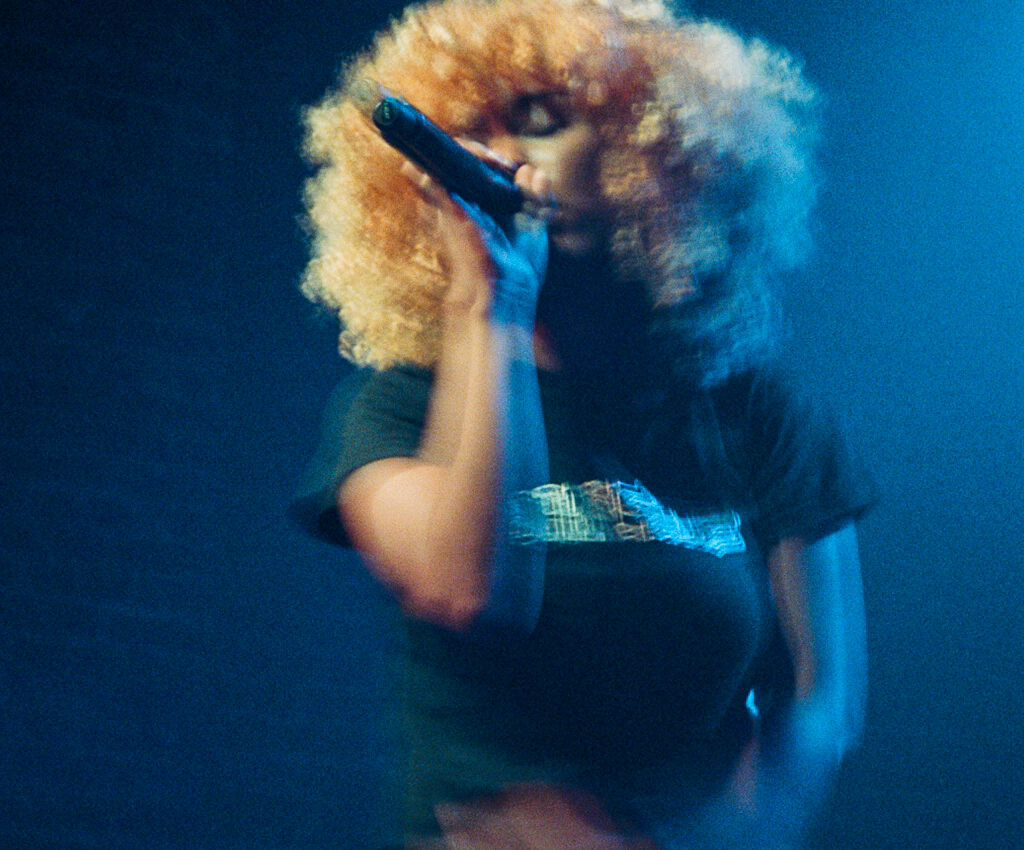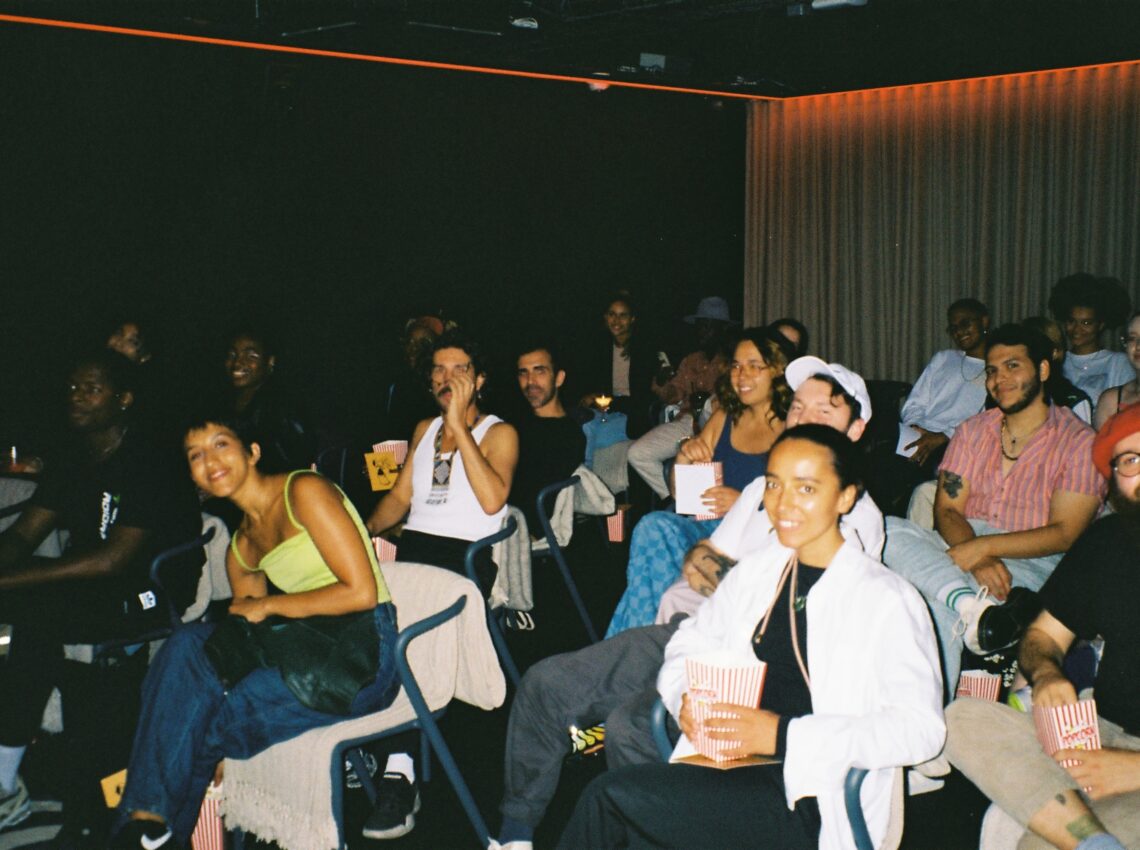LINETT KAMALA TALKS ORIGINAL SOUNDS COLLECTIVE AND MORE [@linett_kamala]
![LINETT KAMALA TALKS ORIGINAL SOUNDS COLLECTIVE AND MORE [@linett_kamala]](https://guap.co/wp-content/uploads/2023/08/Linett-1-1140x850.jpeg)
This past weekend saw women, men, children, uncles and aunties all grace the streets of Notting Hill waving their respective flags in unison to the soundsytems that lined the roads. Carnival is a celebration of community, of culture and togetherness but behind it all there are women like Linett Kamala championing and preserving it’s history. One of the first women to perform at Notting Hill Carnival, Kamala is waving the flag forward, recently launching her amazing mentorship programme, Original Sounds Collective, in partnership with Guinness. The representation of women in sound systems has always been an important thing to Linett, and we got the chance to find out all about it.
Nicole: What was your earliest memory of music growing up?
Linett Kamala: I’ve got a couple. The first one was when parents do that thing where you dance on their feet – you stand on their feet, and they move you around. I remember dancing with my mum to Barry White’s ‘You’re the First, the Last, My Everything’ and we were spinning around, and then I fell off and hit my head on the table. That’s one of my earliest memories of music, dancing with my mum – she loved Barry White.
Nicole: I know art is also a big part of your life and that you’ve had your art showcased nationally in the UK. So, what does art mean to you, and how important is it to you to have that outlet in your life?
Linett Kamala: Art is absolutely essential to me, it’s part of my well-being and keeping my mental health positive. I could describe myself as creative because I’m interdisciplinary, so for me, art is my music, my murals that I do, working with food, and the plant-based stuff that I do. It’s all creative; it’s all art, so I express myself in that way. Carnival is another part of the art, along with the art of sound systems and the art of bringing people together. I love to work in a way that’s engaging, and I would say that my practice is socially engaged, so it’s always about bringing people, doing positive things for people, growing, developing others, and using art as a tool for that.
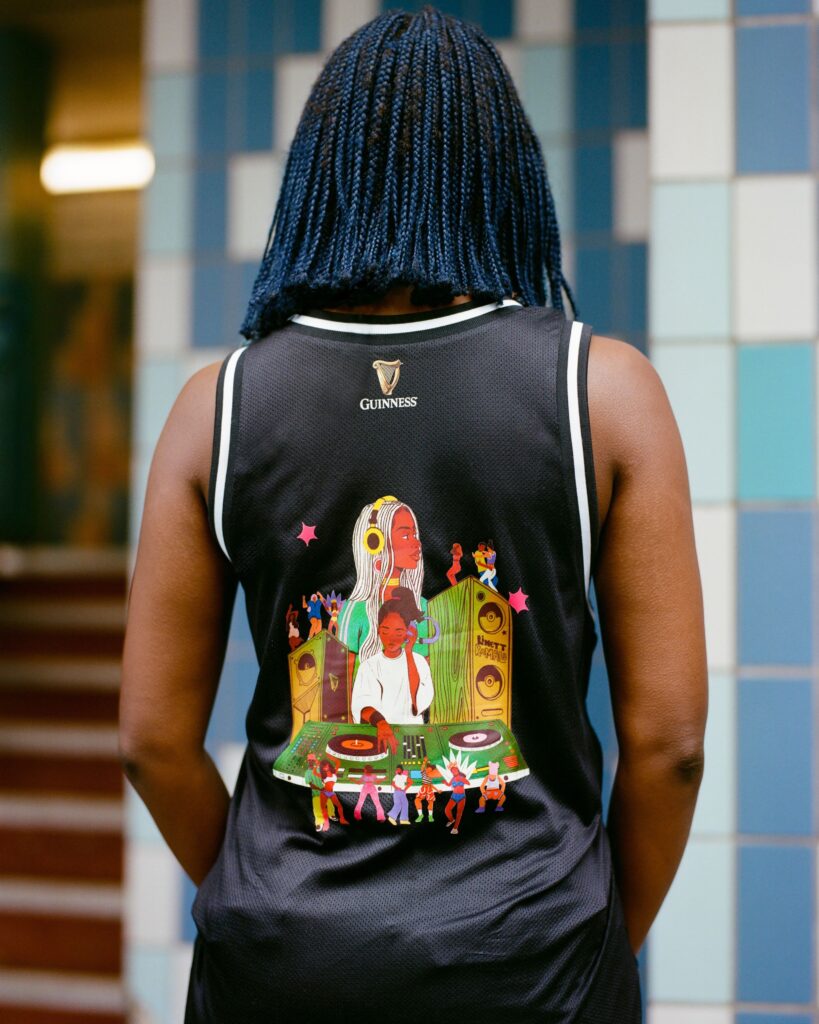
Nicole: What did child you think you would become in the future? Were you always a creative person?
Linett Kamala: Yeah, I was always a creative person! I’m not sure where that came from in terms of my drawing side, because that definitely didn’t come from my mum and dad, they used to draw stick people! My older brother and sister were really talented artists and the three of us were really strong in art, but I’d always been like that from school. I got an award in school, and I remember being given a little cup and being told at primary school age to get on with production and do the entire set design for ‘Toad of Toad Hall’ and making the masks and all of that stuff.
I started DJing as a child, but I didn’t see that as anything – I just loved my music. We were rubbing over our parents’ tapes, and it was exciting, but I had no idea that would become something. If you look now, what DJs have become, it’s a whole career, it’s incredible. I had no idea about that. I was growing up in the 1970s and 80s and girls had to fight to wear trousers at school. So, I didn’t think about careers in music because no one had told me about that, but what I did know is I loved art. I loved helping others, and so I went down that whole art college, and then education route.
Nicole: Now for those that don’t know, you became one of the first female DJs at Carnival at just 15. How did that feel at the time, and how does it feel looking back at that moment?
Linett Kamala: It only kind of dawned on me the significance of it quite recently. Only about four years ago when Mia, who was the PR rep at Notting Hill Carnival (because I became one of the board directors then) and we were just having a casual conversation and talking about our history and our connection with Carnival. And when I told her about that, she was like that’s a really interesting story; I think you should share it. Up until that point, I hadn’t reflected on that side of it because I continued doing sound systems. I was having this double life because I never told the head teacher or students, and so they turn up to Carnival and have the shock of their life seeing me at that sound system that everyone loves to go to. Looking back now, I’m super happy, excited, and honoured. I’m learning more every week about the history of this incredible event. Women like Rhaune Laslett, who founded it and who started it, are inspirational to me. So, to be in a position with this programme, Original Sounds Collective, I’m really grateful because already there’s loads of positivity coming back. There are loads of women reaching out and that’s what I look back on and think, okay wow?!
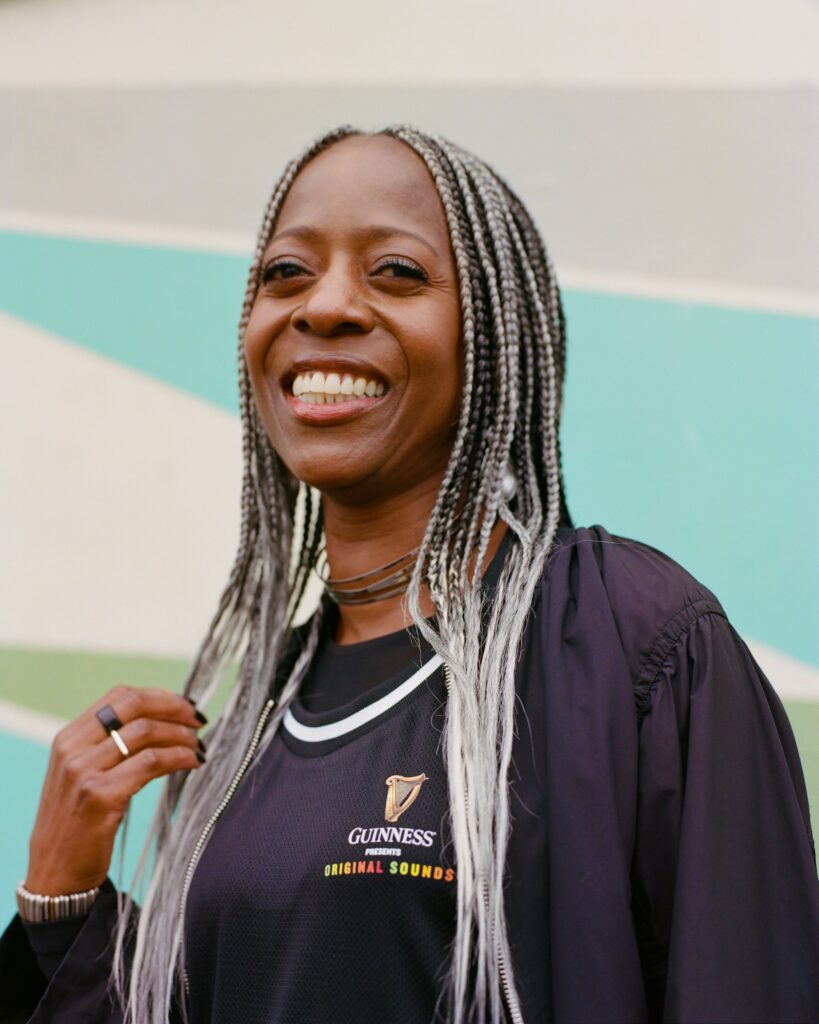
Nicole: Do you have a favourite memory from Notting Hill Carnival?
Linett Kamala: I’ve got so many, but I think it was either 2018 or 2019, and that year it just rained all day on the Sunday, which was sad because it was Children’s Day. I think it was 2018 because it was the first time, we’d done Carnival where I was the board director and we’d done all this work and it just poured with rain all day long, but the people who turned up that year – oh my god! The energy levels were off the scale, because those were the true carnivalists. Everyone was just partying. And then another happy memory that sticks in my mind is with Mastermind sound system. They’re one of the longest-running sound systems, and I used to follow them from back in the day.
Nicole: You’ve launched a musical mentoring programme Original Sounds Collective. What does it feel like seeing more and more women confidently taking up that space, doing their thing, and having their sound systems at Carnival?
Linett Kamala: I think it’s brilliant because we bring a different energy, a different vibe. If you look at the greater picture of sound systems and what most of these events should stand for, it’s about positivity, being inclusive, and about people being able to be their authentic selves. For me, seeing more women starting to do the DJing bit is great. In fact, two of my ex-students are a part of Girls Don’t Sync, and I’m so proud of them. But I really want to try and get people to understand more about the sound system bit and explore what that means. Because there is a built element to it and there is a technical side to it. And there’s the thing about identity and the collective of people with a certain kind of vision. That’s the bit that I’m keen to keep: the tradition. The direct Jamaican roots, and that we don’t kind of lose that aspect.
Nicole: What is Original Sounds Collective about and what is the aim of it?
Linett Kamala: Original Sounds Collective will be about women in sound system. It’s not just DJing, because we’re going to be going increasingly more behind the scenes as well. It’s about bringing people through, shining a light on them, developing them, and supporting people like MC Chickaboo, who I’m working with and also bringing through to Carnival. It’s the first time she’s going to be at Carnival, and imagine she’s like one of the first drum and bass MCs, female MCs. I’m super proud to be a part of the history of this amazing event, and me doing this program is just a part of what I do with trying to bring through the next generation.
If we look now in 2023, there still isn’t enough visibility for women in sound systems at that event and other festivals. As I said, it’s kind of a grassroots mentorship programme, so it’s going to allow women to be developed and hopefully will inspire others, and then we can really push the whole carnival festival culture forward. There are different areas that we’re going to be looking at such as training, production, experiences, and development, and this partnership with Guinness is perfect for that.
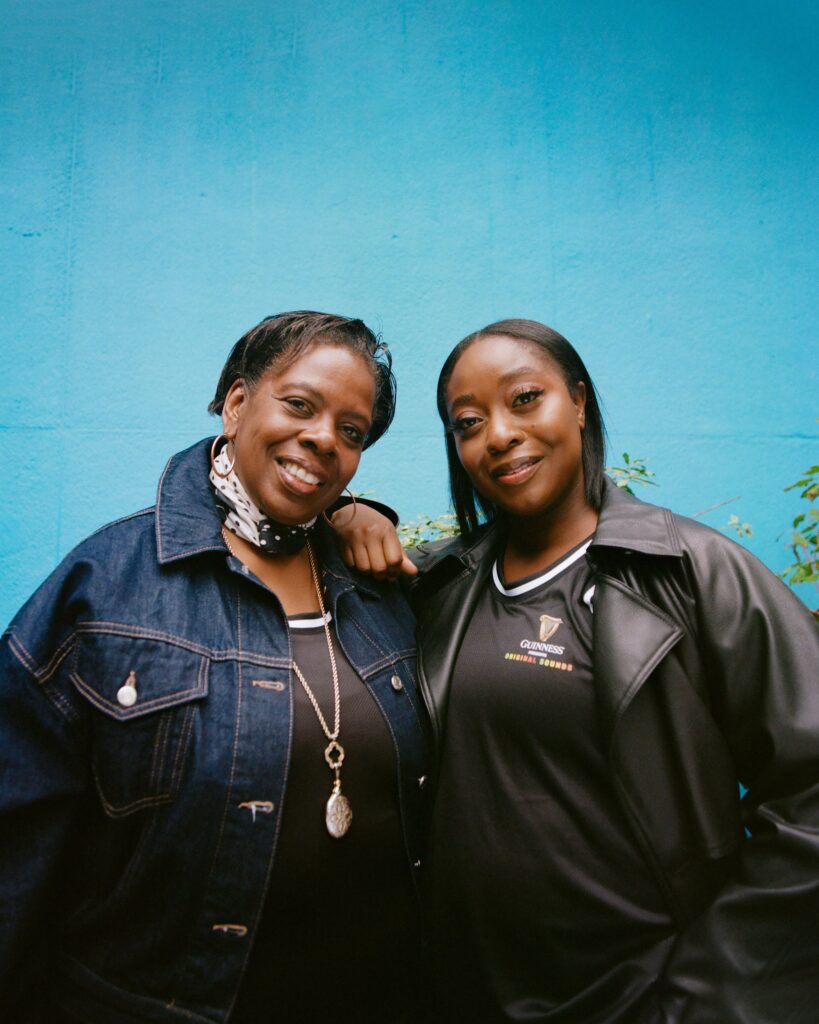
Nicole: How important is it to you for the reason behind Notting Hill Carnival starting to always be remembered no matter how big it gets?
Linett Kamala: So, the first thing is to reference why we’re there, and it’s a tragic situation, which actually comes from the racist murder of Kelso Cochrane on the streets of Notting Hill. The housing in that part of Notting Hill back then was some of the worst housing in the whole country. That’s why they got to be able to live there and were rented in disgusting properties. They were charged a fortune and were being firebombed and beaten up in those properties. Kelso was an aspiring lawyer, and at the time he was working as a carpenter from Antigua and was set upon by five youths and murdered. And the community came out in support and said enough is enough.
That’s where this woman, an incredible woman, Rhaune Laslett comes in. It’s a few years later now (1965, 66), and she’s like, we’ve got to find a way to unite and bring everyone together. And so, she came up with this idea of the little parade, started off with the children’s parade, invited the Trinidadians, Steel Panists and it became more of a Caribbean flavour and a demonstration of a collective. We’re dancing unitedly on the streets of Notting Hill and that’s why it’s called the Notting Hill Carnival. That’s what it’s about, and what a beautiful and incredible legacy.
Neil Shah, Head of Guinness GB says: “From the traditional Guinness punch drink to Sound System sponsorship, Guinness has been part of Notting Hill Carnival for many years and is connected within Caribbean communities in the UK and beyond. We developed the Guinness ‘Original Sounds Collective’ by working closely with carnival leaders, such as Linett Kamala with the aim to make a real difference to the community, by championing women who are looking to push Carnival culture forward. Through championing this new generation of women, we hope to inspire others and fulfil our long-term ambition of supporting even more women who are trying to make a name for themselves in this space.”
Discover more from GUAP’s Music Section here




![ZINO VINCI’S ‘FILTHY & DISGUSTING’EP BRINGS YOU TO THE CORE OF THE ARTIST [@ZinoVinci]](https://guap.co/wp-content/uploads/2023/10/Zino-4.jpg)

